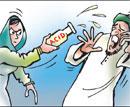
New Delhi, July 2: The Supreme Court today asked the Centre to apprise it of their measures to regulate the sale of acid to prevent its misuse as a weapon, particularly against women by their jilted lovers.
The court sought a "comprehensive affidavit" from the Ministry of Home Affairs, which was asked to "consider proper action" for making appropriate provision for "regulation of sale of acids so that it is not easily or readily available to offenders."
A bench of justices R M Lodha and A R Dave also asked all the state governments and Union territories to file their replies to the notices issued to them on February 11, 2011 for restricting the sale of acid to prevent the growing incidents of attack on women with it.
The court on April 29 this year had asked the Union Home Ministry to coordinate with the various states and the Union territories for formulation of an appropriate scheme.
The apex court had also sought the responses of the Centre and the state governments on whether any suitable scheme can be prepared by them to provide adequate compensation to the victims for their treatment and rehabilitation.
The court's directions came during the hearing of a PIL, filed in 2006 by Laxmi, a minor girl whose arms, face and other body parts were disfigured in an acid attack.
Laxmi, through her counsel Aparna Bhat, had sought framing of a new law or amendment in the existing criminal laws like IPC, Indian Evidence Act and the CrPC for dealing with the offence and had also sought compensation.
Luxmi was subjected to acid attack by three youths near Tughlaq Road as she had refused to marry one of them. The trial is going on for the offence of attempt to murder and two of the accused are out on bail.
The Centre had earlier told the apex court that the report of the Law Commission on the issue was supplied to all concerned parties and the National Commission for Women has placed a draft legislation to make acid attack a serious offence.
The advocate had pleaded for a total ban of sale of acid as there were increasing number of incidents of such attacks on women in different states.
The counsel had submitted that even a small country like Bangladesh had banned the use of acid to prevent such attacks.
The apex court in its February 11, 2011 order had noted that during the pendency of this writ petition, the code of Criminal Procedure, 1973 has been amended and Section 357A has been inserted by Act 5 of 2009.
It also noted that the amendment requires every state government, in coordination with the Central government, to prepare a scheme for providing funds for the purpose of compensation to the victims or their dependants who have suffered loss or injury as a result of the crime and who require rehabilitation.
"Though the said section has come into effect on December 31, 2009 and more than a year has elapsed, we are informed that no schemes have been formulated by any of the state governments," the bench had noted in its order.
While issuing notices to the Centre and state governments in February 2011, the court had directed them to prepare schemes as provided in Section 357A for the purpose of providing compensation to victims of crimes, in particular, acid attack victims.





.jpg)
.jpg)
Comments
Add new comment